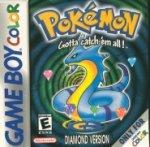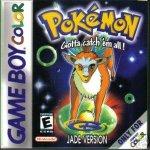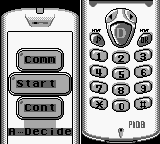Pokémon Diamond and Jade: Difference between revisions
Jump to navigation
Jump to search
Blaziken257 (talk | contribs) No edit summary |
Blaziken257 (talk | contribs) (Oops, was looking at the wrong game) |
||
| Line 4: | Line 4: | ||
| publisher = Unknown | | publisher = Unknown | ||
| designer = Takagi Toushi | | designer = Takagi Toushi | ||
| release-date = | | release-date = Unknown | ||
| genre = [[wikipedia:Console role-playing game|Console role-playing game]] | | genre = [[wikipedia:Console role-playing game|Console role-playing game]] | ||
| mode = Single player/Multiplayer | | mode = Single player/Multiplayer | ||
Revision as of 20:46, 27 February 2008
| Pokémon Diamond and Jade | |
 
| |
| Developer(s) | China pirates |
|---|---|
| Publisher(s) | Unknown |
| Designer(s) | Takagi Toushi |
| Release date | Unknown |
| Genre | Console role-playing game |
| Platform | [[wikipedia:Game Boy Color|Game Boy Color]] |
- For the Pokémon game by Game Freak, see Pokémon Diamond and Pearl.
Pokemon Diamond and Jade are two versions of the bootlegged versions of Keitai Denjū Telefang 1. The Power Version was bootlegged into Diamond, and the Speed Version was bootlegged into Jade.
Translation
The translation has a reputation of being very poor. It is notorious for its Engrish with quotes such as "Some points of 4 lost!" Nearly all the characters' and Denjū's names change in translation.
For example, Shigeki becomes Bek. Kuriputo becomes Kuribute. T-Fanger, a term for people who use Denjū, becomes T-Mildew, Milde-T, and Mildew-T. Another notable characteristic of this translation is the abundant swearing.
Bugs and Glitches
The bootleg version contains numerous glitches, which is the reason why it is so notable.
- The game would not load a save on some carts. Depending on the emulator, selecting "Contin[ue]" when a saved game is present will either cause the game to freeze entirely (which means you cannot do anything until you reset the emulator) or act as if there is no saved game. The problem is not the saved data; the saved data is actually present, but the bootleg cannot load it properly. If one saves on Diamond, then plays Power and imports the save (possible with VisualBoyAdvance or another emulator), it will load the save fine; however, the nicknames will be messed up.
- Dialing secret Denjū causes the game to crash. This makes it impossible to obtain secret Denjū without cheat codes.
- Selecting "Prop" when you have no items causes the game to crash.
- Pressing A+B+Select+Start simultaneously causes the game to crash.
- Pressing Start after the Game Over screen causes the game to crash.
- Rapidly pressing B somewhere in the phone menu screen sometimes causes the game to crash. How this happens exactly is currently unknown.

- The player cannot be named; he/she is automatically named "Bek".
- Denjū cannot be nicknamed; they are auto-nicknamed (with the 6-character limit that the original already had). Additionally, the Lampgela obtained in the game is nicknamed "o".

- The color palette is glitched in the introduction.
- Custom tunes can not be created. When attempting to do so, screeching noises sound, making this feature unusable.
- There is a glitch in Ion Island where the door sometimes locks up after beating Gypsophi.
- On some carts, vases can not be picked up after you shut off the power. However, considering that some carts can not save, this glitch will not even matter.
- When playing in monochrome mode, the title screen is invisible until the Start button is pressed, at which point it darkens and becomes visible.
- When playing in monochrome mode, the background of the letters in the phone menu screen are darker than they should be.
- Credits are removed, and just has a modified "THANK YOU FOR YOUR PLAYING!" text.
- The game's clock does not function as it should. It does not run in real time. This is evident when one uses an emulator. When the emulator is paused, sped up, or slowed down, the clock will do the same as well. In contrast, in the original version, the clock runs at a constant speed (real time) no matter what. In addition, in the bootleg, a second in the game passes after every 50 frames instead of 60, making the clock run 20% faster than normal[1].
References
- ↑ Verified with VisualBoyAdvance's Memory Viewer and Frame Advance features